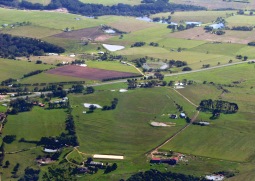
The Minister of Rural Development and Land Reform, Mr Gugile Nkwinti, said central to land reform is the differentiated rural development strategy that would enable a more rapid transfer of agricultural land to black beneficiaries - without distorting land markets or business confidence in the agri-business sector as stated in the National Development Plan.
Besides that, the ministry has also devised other models such as one household one hectare programme to arrest poverty and consolidate food security at local level, he said. "This programme is our spearhead against the triple challenges of poverty, unemployment and inequality. In areas where the programme has been introduced, almost all the beneficiaries were gainfully employed to produce bumper harvests that they sold to local retailers. This addressed the issue of food security and nutrition, employment and poverty eradication through the food they are producing and the income that they earn," he said.
Often government blames the "willing buyer, willing seller" principle, but the truth is that the acquisition of land is so mismanaged that it often takes years to process sales, said Mr Thomas Walters. "It is more a case of 'waiting seller and waiting buyer'. And if this department was an estate agency, it would have been out of business and reported unethical practices long ago. A massive failure rate of creating successful farming ventures exists, he added: "In 2011, this government had a 90% failure rate in its land reform venture. It improved in this term to a 73% failure rate when the recap funding was used to support failing projects. Of course, not inherently dealing with problem but simply throwing money at what are essentially becoming state-supported farms," he said.
The property rights policy is what delays the resolution of the land issue in this country. How can we ask the victims of land dispossession to pay for a land that was illegally acquired?
Resolving the land issue is fundamental to the process of decolonisation and it must be done through expropriation without compensation, said Ms Hlengiwe Hlope. "The first fundamental process towards decolonising South Africa's land ownership is the return of land through the principle of land expropriation without compensation. This principle goes beyond the limits of the "willing buyer, willing seller" approach and also resolves the colonial idiom over land ownership and control - once and for all," she said.
To restore the land to its rightful owners, is to restore the dignity of our people. Land ownership is emotive and has a ripple effect on various spheres of society and means of production. And if it is postponed further, that would be a dereliction of duty by those entrusted with this task, said Mr Mkhuleko Hlengwa.
"We cannot postpone this matter any further and if we continue to do so 22 years on, that in itself would be an indictment on the will of the people."
The privilege few continue to enjoy the fruits of their oppression to this day with impunity without regard to due process, Mr Ahmed Shaik Emam. "The Amandebele a Moletlane tribe of Hammanskraal purchased their land lawfully 100 years ago and were issued with title deeds and yet they were disposed of their land and their ownership of this land still eludes them. The Mouton Report of 1995 and the spatial dynamics research and recommendations in 2013 both recommended the transfer of these seven trust-held tribal farms back to them, but to date this has not been done. This matter must be addressed with extreme urgency or they may have to forcefully occupy the land that rightfully belongs to them," he said.
We want what is rightfully ours, we want our land back so that we can be self-sufficient. That is the loud cry out there, said Mr Mncedisi Filtane.
"The delay in the redistribution of land hampers our ideals for economic development. As we speak, five million people will go to bed tonight without food, under your stewardship. And you have done little to give our people land so that they can be self-sufficient," he said.
The recent incidents of land occupation are fuelled by politicians who are not committed to peace and unity in our country. We need to speed up the process of land redistribution, but in the same vein we cannot correct a wrong with a wrong, said Rev Kenneth Meshoe.
"The invasion of someone else's property is wrong and should be discouraged at all costs. This is in reference to political leaders who tell their supporters that if they see a piece of land and like it, they should just go and occupy it. That perpetuate an already difficult process of land reform, and encourages anarchy and d illegal behaviour," he said.
We call on white land owners to reciprocate reconciliation, to ensure that the social compact in our country is not at the expense of Africans, said Mr Themba Godi. "Our concern is that we have been tip-toeing around white privilege. The challenge to whites to reciprocate reconciliation is almost zero. Yes, let Africans not invade land. But the truth is that the social compact in our country is at the expense of the Africans," he said.
The land ownership patterns in this country still reflect a skewed bias towards the white male monopoly ownership, said Mr Phumzile Mnguni. "The land is the primary means of production. Based on South Africa's unique history, the land ownership patterns still reflect a skewed bias towards the white male monopoly ownership. It produced glaring inequalities fraught with contradictions between urban and rural, men and women, rich and poor. And due to this skewed patterns of land ownership, the extent of poverty has been exacerbated beyond imagination," he said.
By Abel Mputing
2 December 2016

